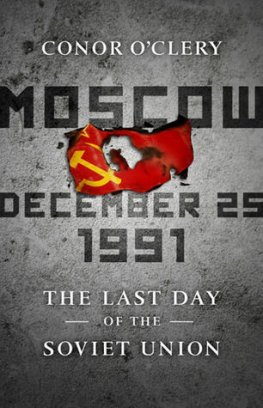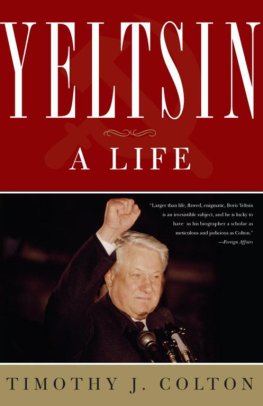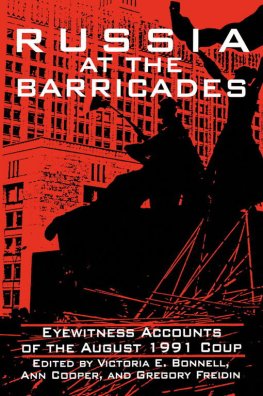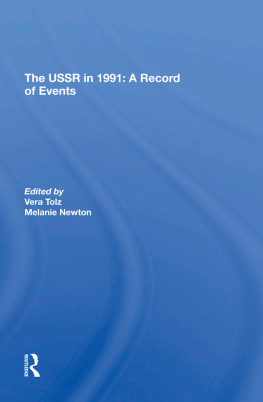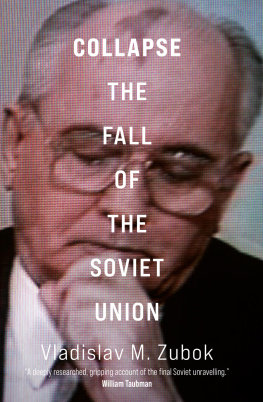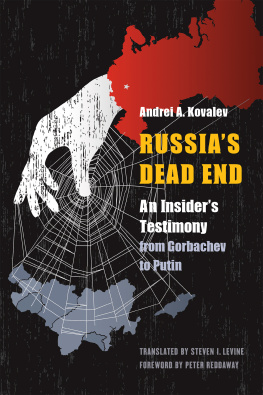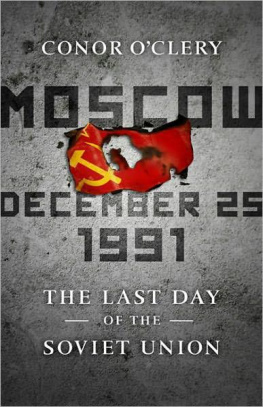Conor OClery
MOSCOW, DECEMBER 25, 1991
The Last Day of the Soviet Union
To Stanislav and Marietta
Goodbye our Red Flag.
You slipped down from the Kremlin roof
not so proudly
not so adroitly
as you climbed many years ago
on the destroyed Reichstag
smoking like Hitlers last fag.
Goodbye our Red Flag.
You were our brother and our enemy.
You were a soldiers comrade in trenches,
you were the hope of all captive Europe,
But like a Red curtain you concealed behind you
the Gulag
stuffed with frozen dead bodies.
Why did you do it,
our Red Flag?
I didnt take the Tsars Winter Palace.
I didnt storm Hitlers Reichstag.
Im not what you call a Commie.
But I caress the Red Flag
and cry.
Yevgeny Yevtushenko, Goodbye Our Red Flag
RUSSIAN/SOVIET DRAMATIS PERSONAE
Afanasyev, Viktor, editor of Pravda, 19761989
Afanasyev, Yury, historian, pro-Gorbachev deputy
Akayev, Aksar, elected president of Kyrgystan in 1990
Akhromeyev, Sergey, marshal of the Soviet army, putschist
Alksnis, Viktor, army officer, campaigned against Gorbachev
Andropov, Yury, general secretary of the Communist Party of the Soviet Union, 19821984
Bakatin, Vadim, pro-reform minister, last chairman of the KGB
Baklanov, Oleg, head of Soviet military-industrial complex, putschist
Belyaev, Igor, documentary maker, friend of Gorbachev
Bessmertnykh, Alexander, Soviet minister for foreign affairs, fired after August coup
Boldin, Valery, Gorbachevs chief of staff, putschist
Bonner, Yelena, widow of Andrey Sakharov
Bovin, Alexander, USSR/Russia ambassador to Israel
Brezhnev, Leonid, first, then general secretary of the Communist Party of the Soviet Union, 19641982
Burbulis, Gennady, close associate of Yeltsin
Burlarsky, Fyodor, pro-reform editor of Literaturnaya Gazeta
Chernenko, Konstantin, general secretary of the Communist Party of the Soviet Union, 19841985
Chernyaev, Anatoly, close associate of Gorbachev
Chubais, Anatoly, Yeltsins deputy prime minister, responsible for privatization
Gaidar, Yegor, Yeltsins deputy prime minister, responsible for shock therapy
Gamsakhurdia, Zviad, elected president of Georgia in 1991
Gerasimov, Gennady, Soviet foreign affairs spokesman
Gorbachev, Mikhail, general secretary of the Communist Party of the Soviet Union, 19951991, president of the Soviet Union, 19901991
Gorbacheva, Irina, daughter of Mikhail and Raisa Gorbachev
Gorbacheva, Raisa, wife of Mikhail Gorbachev
Grachev, Andrey, Gorbachevs press secretary
Grachev, Pavel, army general, sided with Yeltsin in August coup
Grishin, Viktor, Moscow party chief, 19671985
Kalugin, Oleg, KGB dissident
Karimov, Islam, elected president of Uzbekistan in 1990
Khasbulatov, Ruslan, chairman of the Russian Supreme Soviet, 19911993
Khrushchev, Nikita, first secretary of the Communist Party of the Soviet Union, 19531964
Komplektov, Viktor, USSR/Russian ambassador to the United States
Korotich, Vitaly, pro-reform editor of Ogonyok, 19861991
Korzhakov, Alexander, Yeltsins security chief
Kozyrev, Andrey, Russian minister of foreign affairs
Kravchenko, Leonid, head of central television, fired after August coup
Kravchuk, Leonid, elected president of Ukraine in 1991
Kryuchkov, Vladimir, chairman of KGB, putschist
Kuznetsov, Alexander, Yeltsins personal cameraman
Lebed, Alexander, army general, sided with Yeltsin in August coup
Lenin, Vladimir Ilyich, founder of Soviet Union
Ligachev, Yegor, conservative member of Politburo
Lukyanov, Anatoly, chairman of USSR Supreme Soviet, 19901991, putschist
Luzhkov, Yury, mayor of Moscow, 19922010
Moiseyev, Mikhail, army general, supported August coup
Murashev, Arkady, liberal Moscow police chief
Nazarbayev, Nursultan, elected president of Kazakhstan, 1990
Nenashev, Mikhail, head of state television until 1990
Palazchenko, Pavel, interpreter for Gorbachev
Pankin, Boris, Soviet minister for foreign affairs after August coup
Pavlov, Valentin, Soviet prime minister, putschist
Petrov, Yury, aide to Yeltsin
Petrushenko, Nikolay, army officer, campaigned against Gorbachev
Plekhanov, Yury, KGB general who held Gorbachevs prisoner during August coup
Poltoranin, Mikhail, ex-editor, Yeltsin press secretary
Popov, Gavriil, mayor of Moscow, 19901992
Primakov, Yevgeny, director of foreign intelligence service after August coup
Pugo, Boris, Soviet interior minister, committed suicide after August coup
Putin, Vladimir, aide to St. Petersburg mayor, later president and prime minister of Russia
Redkoborody, Vladimir, KGB officer in charge of presidential security
Revenko, Grigory, aide to Gorbachev
Rostropovich, Mstislav, cellist and supporter of reform
Rutskoy, Alexander, vice president of Russia, 19911993
Ryzhkov, Nikolay, Soviet prime minister, 19851990
Sakharov, Andrey, physicist and human rights campaigner
Shakhnazarov, Georgy, adviser to Gorbachev
Shakhrai, Sergey, Yeltsin aide, drafter of Belovezh accord
Shaposhnikov, Yevgeny, air force general, appointed Soviet defense minister after August coup
Shatalin, Stanislav, radical economist
Shenin, Oleg, Communist Party Central Committee secretary, putschist
Shevardnadze, Eduard, Soviet foreign minister, elected leader of Georgia in 1992
Shushkevich, Stanislau, elected chairman of Belarus parliament in 1991
Silayev, Ivan, last Soviet prime minister
Sobchak, Anatoly, pro-reform mayor of St. Petersburg
Solzhenitsyn, Alexander, former political prisoner and writer
Stalin, Joseph, general secretary of the Communist Party of the Soviet Union, 19221952
Sukhanov, Lev, assistant to Yeltsin
Suslov, Mikhail, Soviet ideologist in Brezhnev era
Tarasenko, Sergey, aide to Shevardnadze
Tretyakov, Vitaly, pro-reform editor of Nezavisimaya Gazeta
Tsipko, Alexander, Gorbachev speechwriter
Varennikov, Valentin, army general, putschist
Vlasov, Alexander, Communist candidate defeated by Yeltsin in election for chairman of Russian Supreme Soviet
Vorontsov, Yury, USSR/Russian ambassador to United Nations
Yakovlev, Alexander, diplomat, close adviser to Gorbachev, inspiration for perestroika
Yakovlev, Yegor, pro-reform editor of Moscow News, later head of state television
Yanayev, Gennady, vice president of Soviet Union, putschist
Yaroshenko, Viktor, aide to Yeltsin
Yavlinsky, Grigory, radical economist
Yazov, Dmitry, Soviet minister of defense, putschist
Yeltsin, Boris, Moscow party boss, 19851987, chairman of Russian Supreme Soviet, 19901991, president of Russia, 19911999
Yeltsina, Naina, wife of Boris Yeltsin
Zhirinovsky, Vladimir, far right Russian politician
This book is a chronicle of one day in the history of one city. The day is Wednesday, December 25, 1991. The city is Moscow. It is the day the Soviet Union ends and the red flag comes down from the Kremlin. It is witness to a deeply personal and politically charged drama, marked at the highest levels (and out of sight of the public) by shouts, tears, reminiscences, and melodrama. It climaxes in a final act of surrender by Mikhail Gorbachev to Boris Yeltsin, two extraordinary men who despised each other and whose interaction shaped modern Russia.
In reconstructing the events of this midwinter day, I have combined my interviews and my own research in television and newspaper archives with material from over a hundred memoirs, diaries, biographies, and other works that have appeared since the fall of the Soviet Union in English and Russian. I have also drawn on my experience observing Gorbachev and Yeltsin up close in the last four years of Soviet rule, when I was a correspondent based in Moscow. During this period I frequented the Kremlin and the Russian White House, where the fight between the two rivals played out. I hung around parliamentary and party meetings, grabbing every opportunity to question the two leaders when they appeared. I interviewed Politburo members, editors, economists, nationalists, Communist Party radicals and hard-liners, dissidents, striking coal miners, and countless people just trying to get by. I was a face in the crowd at pro-democracy rallies, at Red Square commemorations, and at the barricades in the Baltics. I traveled around Russia, from Chechnya to Yakutsk, and to the republics of Armenia, Azerbaijan, Belarus, Estonia, Kazakhstan, Latvia, Lithuania, Moldova, Tajikistan, Ukraine, and Uzbekistan, observing the changes sweeping the USSR that would lead to the denouement on Christmas Day 1991. And since then I have returned to Russia regularly, for both professional and personal reasons.

